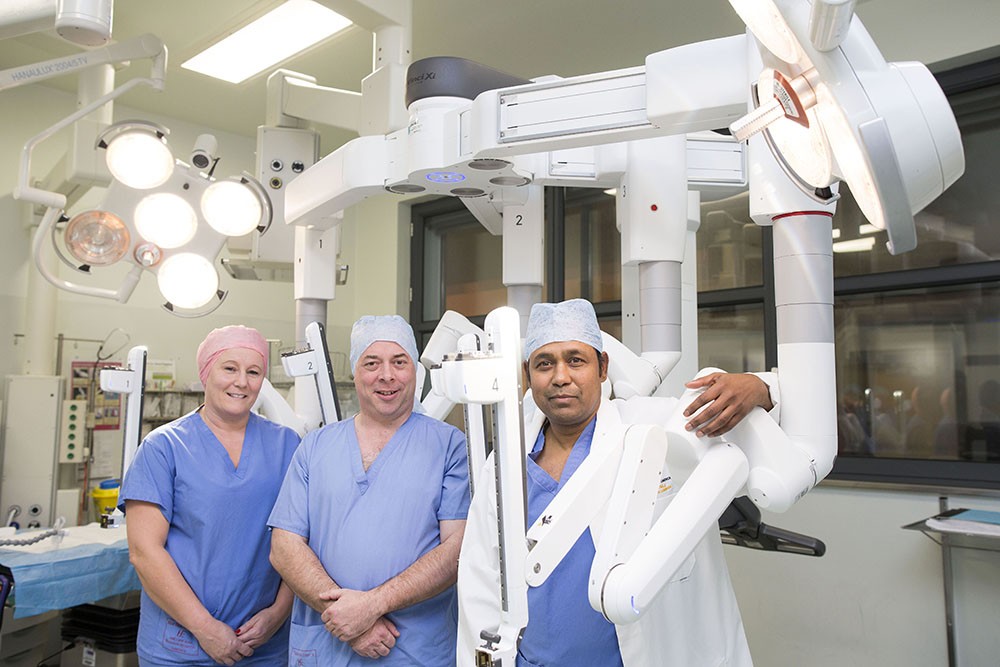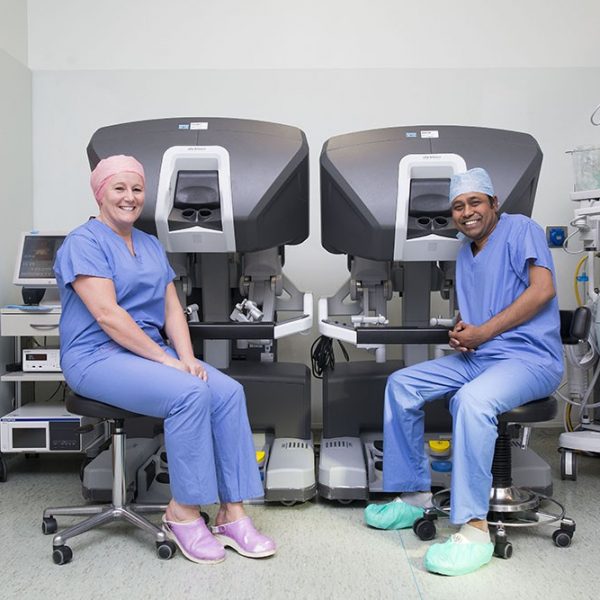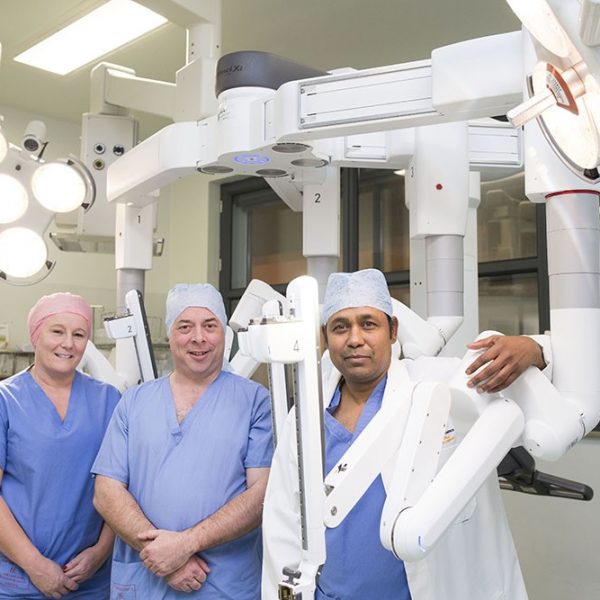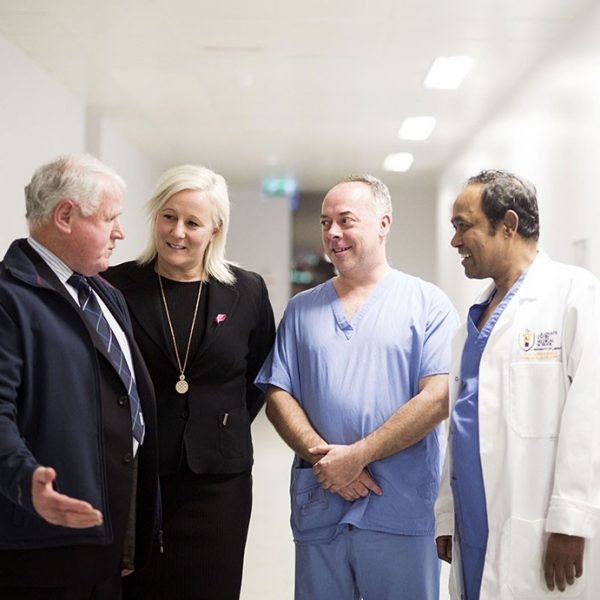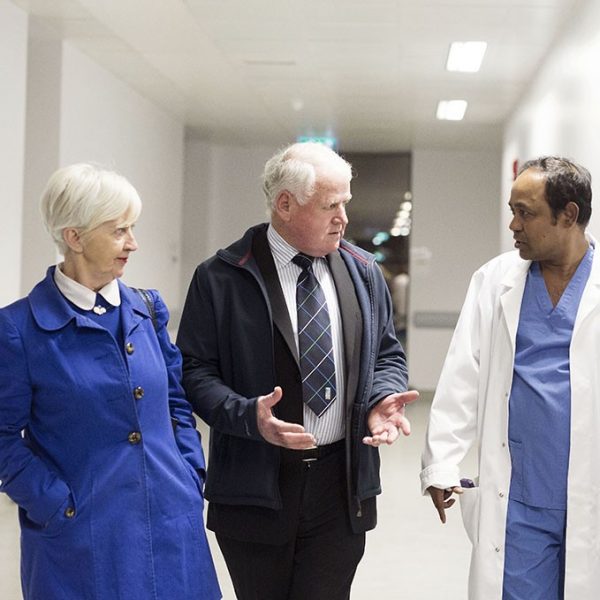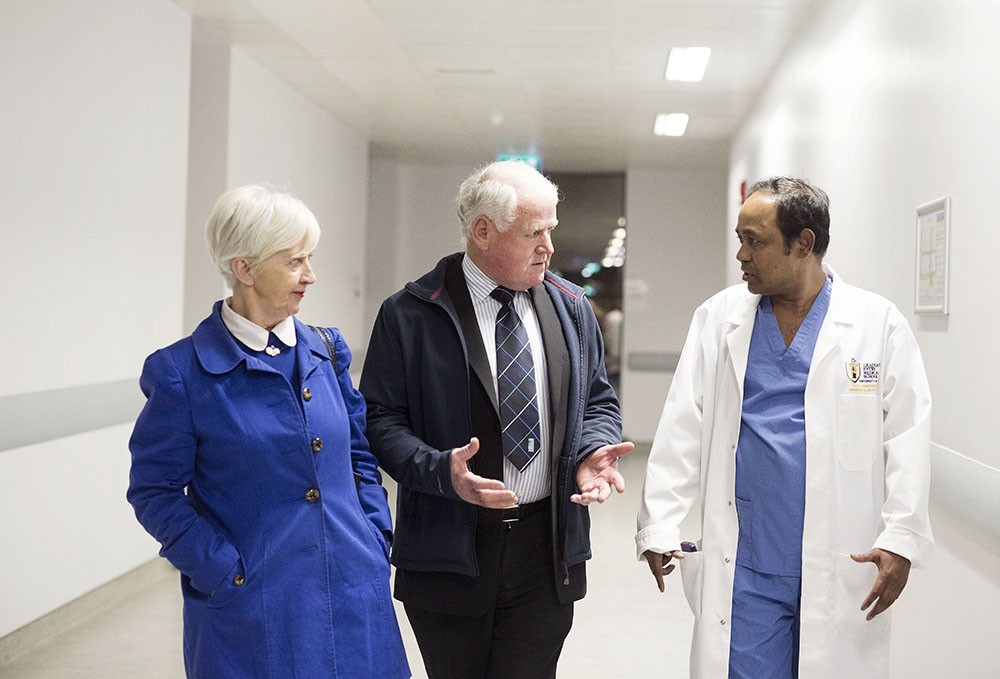
The University Hospital Limerick (UHL) is the first hospital in Ireland to perform Colorectal, Renal and Adrenal surgical procedures using a state of the art robot, it was revealed today at the launch of the hospital’s robotic programme.
The pioneering surgeons involved are, for the colorectal procedures, Professor J. Calvin Coffey, Foundation Chair of Surgery at the Graduate Entry Medical School, University of Limerick (UL) and general and colorectal surgeon, UHL and for renal, Mr Subhasis Giri, who is a urological surgeon at UHL. The robotic surgery was performed using the Da Vinci Xi Dual Console Robot, the only one of its kind in a public hospital in Ireland.
The Da Vinci Xi robotic programme, now underway at UL Hospitals Group cost €2.8 million in total. UL Hospitals acknowledges and thanks the Midwestern Hospitals Development Trust, the JP McManus Benevolent Fund, UL and the University of Limerick Graduate Entry Medical School for their generous support in this fantastic collaborative project of which UL Hospitals Group is very proud.
Valued at approximately €2.6m, the Da Vinci Xi robot and equipment was donated by the Midwestern Hospitals Development Trust and funded with the generous support of the JP McManus Benevolent Fund.
Midwestern Hospitals Trust Chairman Jim Canny commented: “This is a great collaborative project and the Board of the Mid-Western Hospitals Development Trust are delighted to support it. It means that all patients in the Midwest requiring surgery such as colorectal or urological, now have access to this state of the art robotic technology which means that they will have better outcomes overall. We look forward to working with the Hospital and UL on projects of a similar nature in future.”
Robotic surgery represents the highest international standard of surgery worldwide and is the most advanced form of key hole surgery available to patients.
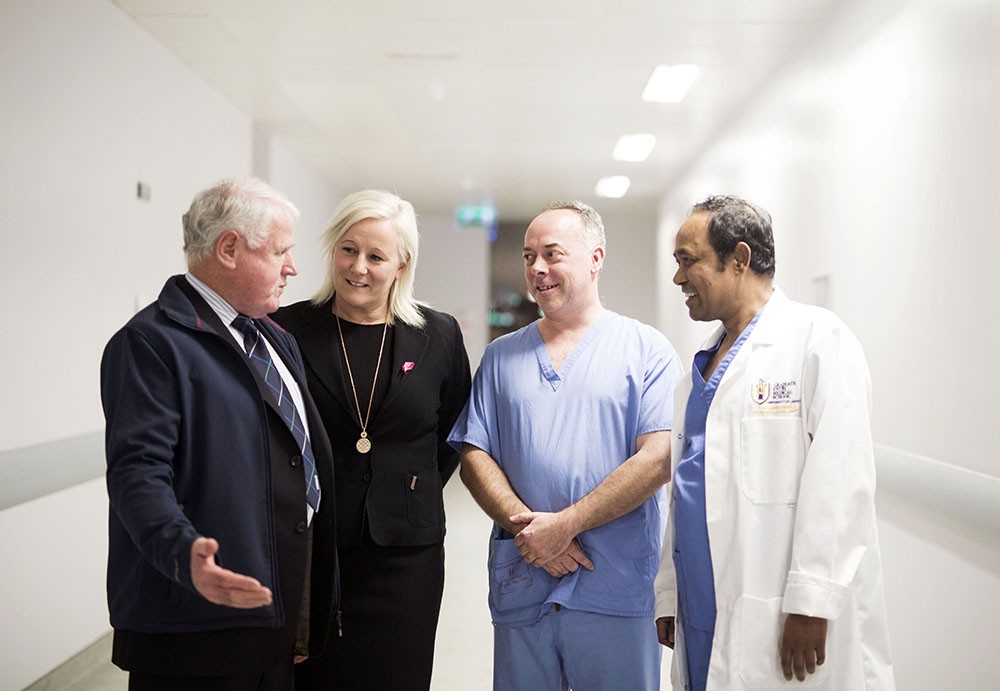
Preliminary data from UL Hospitals Group demonstrates that post-operative recovery is twice as fast with robotic surgery than with standard keyhole surgery, with an average postoperative hospital stay of approximately 4 days. “Very early discharge is the exception rather than the rule in keyhole intestinal surgery. It seems to be the rule rather than the exception in robotic assisted surgery,” Professor Coffey commented. There is also minimal blood loss and a reduction in post-operative pain with robotic surgery.
Mr Michael Hanrahan, a retired Aer Rianta employee from Ennis in Co. Clare, had a tumor removed from his kidney in June this year, this was the first robotic operation of its kind carried out in Ireland and was performed by Mr Subhasis Giri at UHL.
Mr. Giri has conducted 20 robotic complex Kidney Cancer procedures at UHL, in most of them he was able to preserve or save the kidney while removing the tumour only, thereby potentially avoiding the requirement of Dialysis later in life.
“The first thing that struck me was the state-of-the-art nature of the theatres and post-operative recovery area I was in afterwards. I thought is this new? I certainly wasn’t aware of it. I remember seeing the robot and thinking how is that going to operate on me? The incision was so small it was remarkable. I was delighted with my recovery, I was back playing golf in a matter of weeks,” Michael explained.
The Da Vinci Xi technology has particular advancements not available with standard keyhole surgery. 3D-HD visualisation provides surgeons with a highly magnified view, virtually extending their eyes and hands into the patient, almost as if the surgeon were ‘standing inside the abdomen and reaching out to the organs’.
The robot is secured or ‘docked’ to the patient and has 4 working arms (each requiring only an 8mm skin incision) to which operating instruments are attached. Once docked, the robotic arms and instruments are controlled by the surgeon, or surgeons, who are seated at the consoles nearby. The instruments are extremely precise, with no tremor, and they can in fact achieve activities not possible with the human hand, though they would never replace the human hand, they are completely controlled by the surgeon.
Professor Coffey said: “Up to now, robotic surgery has been embedded in the private sector, apart from gynaecologic surgery. Now, for the first time, it is available to public patients in the Midwest for colorectal and renal or urologic cases. The dual console will allow not one, but two surgeons to operate simultaneously ensuring optimal decision making and precision for each individual patient, the expertise is doubled.”
UHL also has the ability to broadcast live surgery within the hospital right now to its junior doctors on a small scale and will be able to broadcast live to the University of Limerick in the coming months. This provides an unrivalled educational program for medical staff, nursing staff and students alike.
UL, Academic Partner to UL Hospitals Group, donated €135,000 to the project for Audio Visual and training equipment.
Consultant Surgeon Professor Mike Larvin, Head of the Graduate Entry Medical School (GEMS) at University of Limerick said: “UL is thrilled to support the launch of the Da Vinci Xi surgical robot with our main teaching hospital partner, UHL. This makes a new form of ‘precision surgery’ available to patients requiring operations for cancer and other serious diseases, and Limerick can be proud that this is the first such device to be installed in a public hospital in Ireland.”
UL Hospitals Group CEO Colette Cowan said: “The aim of the robotic program is simply to improve outcomes for our patients in a caring, confident and compassionate manner. On average three robotic cases are now conducted weekly in UHL and all patients in the Midwest can have equal access to this surgery if referred to us by their GP. Led by Professor Coffey and his team, a huge amount of work has gone into this project since the arrival and installation of the robot in May from training through to accreditation and the first case in June.”
The Da Vinci Xi program is already expanding under the guidance of Ms Suzanne Dunne, Head of Strategy UL Hospitals Group and Project Manager for the Robotic Surgery Program. Mr Colin Pierce is a colorectal surgeon recently back from training in the Cleveland clinic. His joining the robotic team has vastly expanded the repertoire of types of surgery provided by this program.
The program is also scheduled to expand to include gynaecological, endocrine and pelvic floor diseases.
